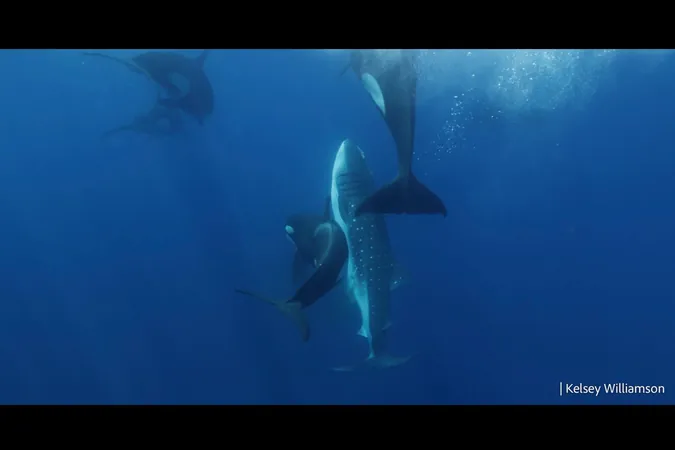
Shocking Discovery: Orcas Off Mexico Master the Art of Hunting Giant Whale Sharks!
2024-11-28
Author: Ming
Introduction
In an astonishing revelation, scientists have uncovered that orcas (Orcinus orca), often dubbed as the 'wolves of the sea,' have developed the remarkable ability to hunt whale sharks (Rhincodon typus), the largest fish on the planet. This groundbreaking phenomenon was documented among a certain pod of orcas residing in the Southern Gulf of California, Mexico, marking a significant leap in our understanding of these apex predators.
Research Findings
Marine biologists dedicated six years to studying this extraordinary behavior and amassed compelling evidence of orca attacks on whale sharks. At the forefront of these lethal encounters was a male orca known affectionately as Moctezuma. These findings, recently published in the journal Frontiers in Marine Science, not only confirm anecdotal reports of orcas preying on whale sharks but also highlight sophisticated hunting techniques that may have been shared and perfected within the orca community.
Orca Hunting Behavior
Despite their playful portrayal in popular culture, orcas are formidable hunters. They typically prey on a diverse assortment of marine life, including seals, fish, and even fellow cetaceans. Historically, orcas have been observed preying on various shark species, including the notorious great white, but hunting whale sharks presented an unprecedented challenge due to their sheer size. Adult orcas measure about 20 feet (6 meters) in length and weigh around six tons, considerably smaller than their whale shark counterparts, which can grow up to 45 feet (13.7 meters) long and weigh an incredible 20 tons or more.
Juvenile Whale Sharks
Interestingly, while adult whale sharks don’t have natural predators, smaller juveniles can fall victim to large fish or sharks. The presence of juvenile whale sharks in the Gulf of California, along with several instances of orca attacks, has sparked curiosity and concern among marine conservationists.
Hunting Episodes
Through a meticulous collection of photo and video evidence, researcher Erick Higuera Rivas and his team documented four distinct hunting episodes occurring from 2018 to 2024. They discovered that orcas employed a systematic approach to subdue their massive prey. Focusing their attacks on the pelvic region of the whale sharks, the orcas created a tactic that exacerbated the shark's injuries, ultimately leading to its demise and granting the orcas access to the nutrient-rich liver, a delicacy for them.
Cooperative Strategy
“Our research illustrates a remarkable cooperative hunting strategy among orcas,” said Higuera Rivas. “By turning the whale sharks upside down, they induce a state of tonic immobility, rendering them temporarily paralyzed and helpless.”
Implications for Orcas
The frequency of Moctezuma's involvement in these hunting events suggests that he, along with other pod members, has effectively specialized in this newly acquired hunting method. It raises the question of whether other orca pods globally might also develop similar techniques to hunt the whale shark, which is predominantly found in warm tropical waters.
Conservation Concerns
This revelation is not only fascinating but carries vital implications for marine conservation. Any significant threats to the whale shark population in the Gulf of California could disrupt the fragile balance of this ecosystem. Researchers emphasize the importance of implementing protective measures to safeguard this environment, particularly from the potential pressures of tourism and fishing activities.
Conclusion
As we continue to explore the mysteries of the deep, exciting discoveries like this one remind us that the ocean teems with enigmas waiting to be unveiled. The sophisticated social behaviors and hunting strategies of orcas challenge our perception of these remarkable creatures and highlight our responsibility to preserve their habitats.


 Brasil (PT)
Brasil (PT)
 Canada (EN)
Canada (EN)
 Chile (ES)
Chile (ES)
 España (ES)
España (ES)
 France (FR)
France (FR)
 Hong Kong (EN)
Hong Kong (EN)
 Italia (IT)
Italia (IT)
 日本 (JA)
日本 (JA)
 Magyarország (HU)
Magyarország (HU)
 Norge (NO)
Norge (NO)
 Polska (PL)
Polska (PL)
 Schweiz (DE)
Schweiz (DE)
 Singapore (EN)
Singapore (EN)
 Sverige (SV)
Sverige (SV)
 Suomi (FI)
Suomi (FI)
 Türkiye (TR)
Türkiye (TR)